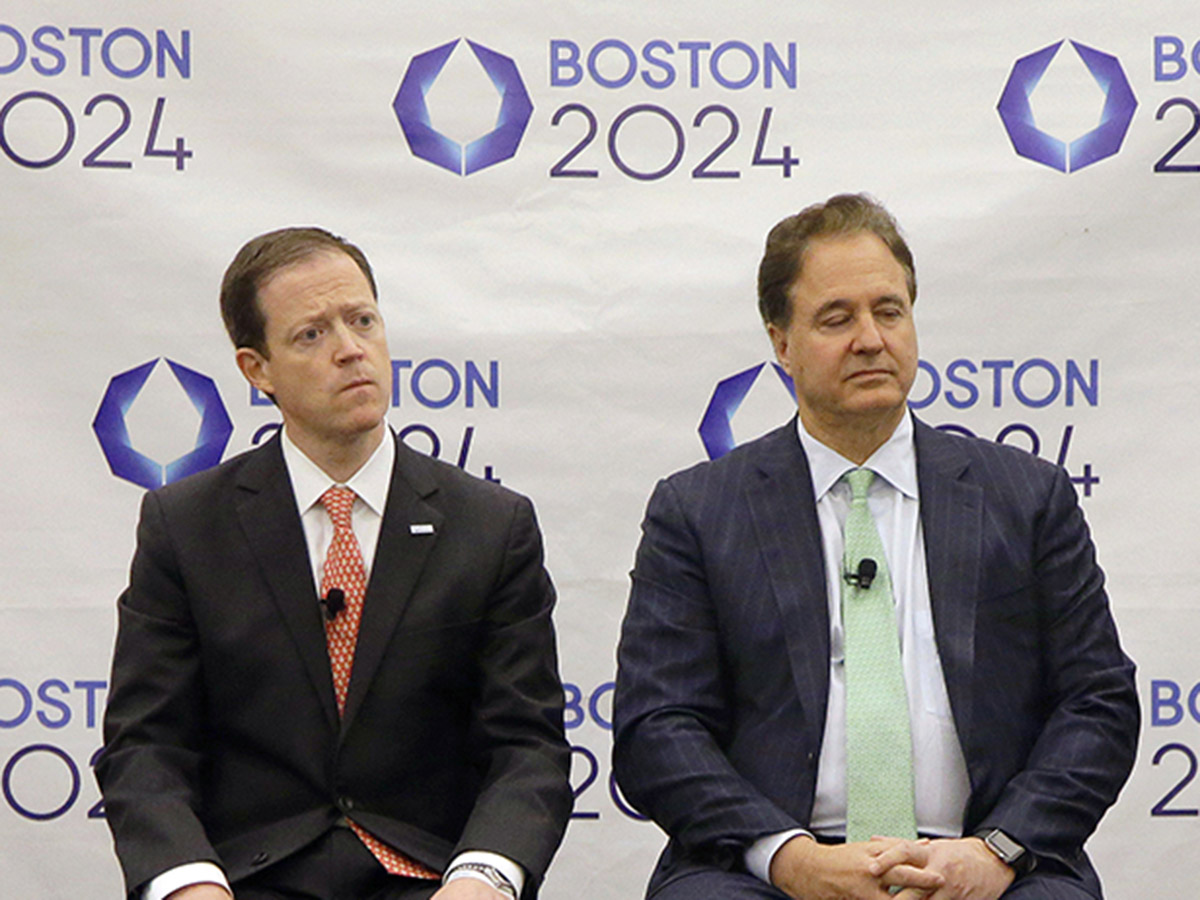Boston 2024’s Priorities in Death Reveal Its Motives While Still Alive

Photo via AP
Last summer, Boston 2024’s Movement Committee met to flesh out its vision of a bid that would woo the United States Olympic Committee. A portion of this meeting’s notes, obtained via public request, include a curious bit about the uncertain future.
“The ethos of Boston 2024 will endure well beyond the bid process and the Games,” the notes read. “We will commit to 1-2 signature programs even if Boston does not win the bid. We will leave the Olympic legacy to the next generation of athletes better than we had it.”
Just over a year later, Boston is watching the Olympic bidding process from the sidelines after the USOC pulled the plug on its anemic bid. The Brattle Group, a Cambridge-based global consultancy firm commissioned by the Beacon Hill Big Three, performed an autopsy on Boston 2024’s Bid 2.0 and waved around the worst bits of offal in a scathing report released Tuesday.
Boston 2024 has spent its first month out to pasture doling out branded merchandise to its staff and unpaid interns and issuing a 1,000-word rebuttal to the Brattle Group’s report.
And another more exhaustive response is forthcoming.
What could be the bid organizers’ motivation for this? It’s not as if Gov. Charlie Baker and Mayor Marty Walsh would read Boston 2024’s next rebuttal and call a mulligan. Boston’s Olympic hopes for 2024 are stone-cold dead, and no Infinite Jest-sized rebuttal will change that.
So what’s left to save? Face, mainly. (A spokesperson for Boston 2024 did not respond to Boston magazine’s inquiries regarding who is composing the responses, if they are being paid to do so, or if there are any plans to deliver on those one or two “signature projects.”)
“We feel like it’s important to point out the inaccuracies—and amend as possible—because it’s bad public policy,” Chairman Steve Pagliuca told the Globe‘s Shirley Leung in her latest column, which she, for the umpteenth time, chides us small-minded Bostonians for being dissuaded from the Olympic mystique by such silly things as “numbers” and “costs” and “debt.”
“Imagine what would have happened if former transportation secretary Fred Salvucci focused on the price tag of the Big Dig rather than what depressing the Central Artery would do to make Boston a better place,” Leung writes. “Construction was painful—and expensive—but we got a whole new city: a third harbor tunnel, the Rose Kennedy Greenway, the Zakim bridge, and the Seaport District.”
Here’s the key difference between massive, public endeavors like the Big Dig and privately driven ventures like the Olympics. The former was, from its very inception, designed to improve the city’s infrastructure and the lives of those who live here. The latter is a bloated sporting event with transportation projects tossed in as sweetener, miscalculations of which would have increased costs up to $1.3 billion—a Brattle Group finding that bid organizers thought better of touching in their rebuttal.
Let’s be honest—if Pagliuca had gone through his professional career as an accountant with the cavalier “numbers aren’t everything” approach espoused in Leung’s piece, he wouldn’t have made it to Bain Capital. He wouldn’t have been able to run a lemonade stand.
Boston 2024 is hardly the victim of some Camus-style persecution, or even the kind foisted upon Tom Brady by the NFL. Unlike the dubiously independent investigation led by Ted Wells, we have no reason to believe the Brattle Group’s report is anything but independent. And by now, hasn’t Boston 2024 worn out its benefit of the doubt? How many times did bid organizers say one thing to the public and another to their masters at the USOC before taxpayers said, “You know, I think I’ll believe someone, anyone else.”
Boston 2024’s myopic obsession with control of the narrative suggests the entire multimillion-dollar undertaking was merely a vanity project. Otherwise, the money remaining in its cobweb-lined coffers would be unloaded into the communities it promised to reinvigorate—not spent on lipstick for a corpse.

